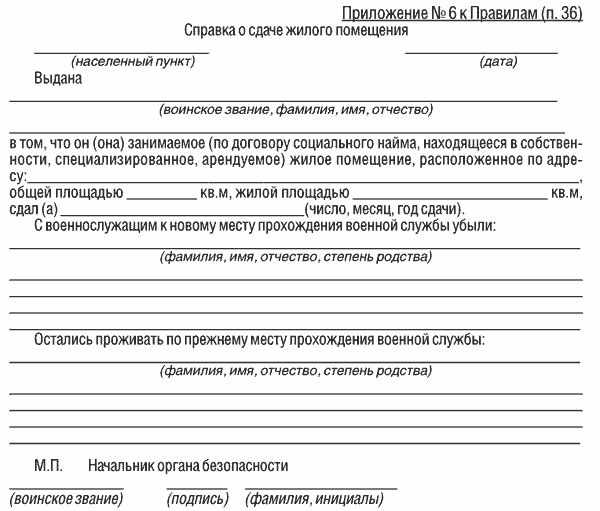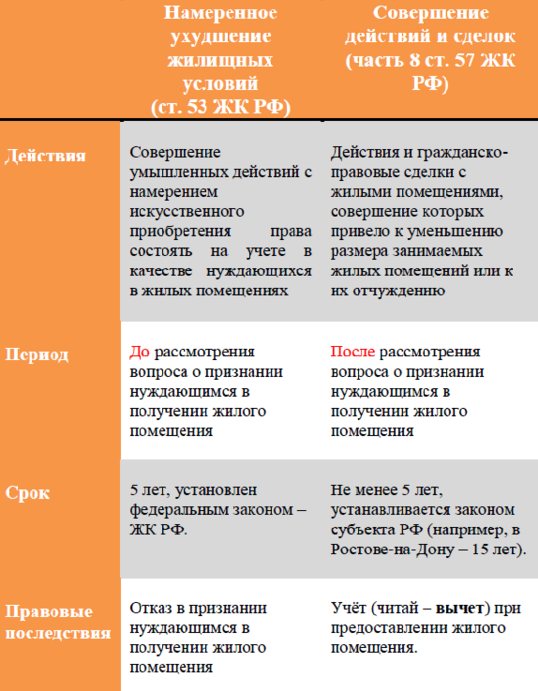In 2005, a new Housing Code of the Russian Federation came into force and along with it a definition of the concept of “intentional deterioration of housing conditions” appeared in legal practice. Now, at the legislative level, if there is evidence, it is possible to convict a citizen of committing deliberate actions to worsen the conditions of his home for selfish purposes.
Dear readers! Our articles talk about typical ways to resolve legal issues, but each case is unique. If you want to find out how to solve your particular problem, please use the online consultant form on the right or call. It's fast and free!
What is it and what actions can be regarded as intentional?
Intentional deterioration of living conditions is any deliberate action with the aim of worsening living conditions in order to recognize them as such and receive new square meters from the state .
Article 53 of the Housing Code of the Russian Federation, where this concept appears, does not provide clear explanations of exactly what activities can be regarded as intentional.
In order to determine the main signs of malicious actions, one can rely on the conclusions of the Constitutional Court and the practice of lawyers, where the main sign of such intentions is premeditation:
- Sale of comfortable housing for the purpose of purchasing dilapidated real estate;
- Unequal exchange - a comfortable apartment for a large family for a small one-room apartment;
- Section of real estate to register for improvement of living conditions.
How to obtain the right to permanent, unlimited use of a land plot? Details at the link.
At the same time, a person must be clearly aware of his actions and recognize that this abuse will lead to:
- Recognition of housing as unsuitable and registration;
- He must admit that at the time of his actions he had a clear intention to worsen the condition of the housing;
- During the period of action, a person should not be registered, since otherwise all intentionality will cease to be so.
Consequences of such actions
Despite the fact that deliberate actions are punishable by law, the punishment for committing them is fair - a person who has committed a deliberate deterioration in living conditions will not be able to register for 5 years from the date of committing such actions.
Consequences of deliberate deterioration of living conditions.
What is intentional deterioration of living conditions?
In accordance with Article 53 of the Housing Code, Citizens who, with the intention of acquiring the right to be registered as those in need of residential premises, have committed actions as a result of which such citizens can be recognized as needing residential premises, are registered as those in need of residential premises not earlier than five years from the date of commission of these intentional actions.
Thus, the deliberate deterioration of living conditions has a number of mandatory features:
- they (intentional deterioration) are committed by a citizen who has the goal of acquiring the right to be registered as needing housing;
- this citizen is not registered as needing housing;
- these actions are committed intentionally (with the intention of obtaining the right to be recognized as in need of housing);
- As a result of such actions, a citizen may be recognized as in need of housing*.
* (Article-by-article commentary to the Housing Code of the Russian Federation / Under the general editorship of N.M. Korshunov. M., 2005. P. 146 – 147).
Regulation of this issue in the Housing Code of the Russian Federation
Since this definition is indicated by Art. 53 of the Housing Code of the Russian Federation in a rather laconic form and there is no detailed formulation of what actions are considered intentional; this issue was given a clearer justification by the Constitutional Court in Ruling No. 258-0-0 of July 19, 2007.
What should be the distance from the house to the property line? Full information in this article.
The imperfection of the main legislative act - Article 53 of the Housing Code of the Russian Federation in resolving such a sensitive issue makes it possible for local authorities, whose competence is to consider each case, to abuse the flaws in the article and use it for personal interests.
What actions cannot be interpreted as intentional deterioration?
There is a whole list of actions, the commission of which cannot be regarded as a violation of Art. 53 Housing Code :
- Registration and placement of children under the age of majority with one of the parents;
- Move-in and registration with any of the relatives or parents, spouse, while observing all the prescribed standards;
- Refusal to fulfill the terms of a deed of gift or a donation agreement for a share of housing by one of the parties;
- Refusal of the rent agreement by the recipient and transfer of the residential premises to the lessor;
- Moving people in at the place of temporary registration;
- By court decision, recognition of a void real estate transaction.
Deliberate deterioration of living conditions for military personnel
The deliberate deterioration of housing for military personnel is discussed in detail in the Instructions, on the basis of which office housing is provided to contract soldiers or under a social tenancy agreement.
From this document it follows that such actions include :
- Deliberate violation of the rules for using housing;
- Exchange of housing for a smaller area, which creates uncomfortable living for each family member;
- Entering into a fictitious marriage and registering a new spouse on your territory;
- Divorce and allocation of shares in the apartment;
- Violation of clauses of a social tenancy agreement or deliberate failure to pay rent for the use of housing for a long period;
- Alienation of a certain part of the apartment through a purchase and sale transaction or drawing up a deed of gift for its share, which will significantly reduce the usable space for the serviceman and his family.
The Instructions also contain a list of actions that can be performed and are not considered intentional.
Why might you need an apartment card? Read about the features of this document by following the link.
Moving relatives, children, parents, spouses into the territory of a military personnel by court decision, if they:
- Are not owners of personal property;
- They had housing that was later found unsuitable;
- Lost ownership of real estate due to marriage to a military man and subsequent move to his place of service;
- They lost the right to housing due to a court decision recognizing the transaction with it as unlawful, and as a result they cannot use it.

Certificate of rental of residential premises.
Intentional deterioration of living conditions: what does this mean for someone on the waiting list for an apartment?
The new Housing Code, adopted ten years ago, for the first time defined what deliberate deterioration of living conditions is and what consequences such an act could have on the part of a future new resident. The interpretation of the law provides for the responsibility of a citizen who consciously and intentionally takes measures that could worsen his living conditions in order to register as a person who needs help with obtaining or building a new apartment.
- conscious change in the use of residential premises;
- exchanging an apartment for a smaller one, leading to a decrease in the level of provision of living space for each family member;
- entering into a marriage on a fictitious basis and registering a spouse in one’s own living space;
- divorce and subsequent allocation of shares in the apartment;
- violation of the provisions of the social rental agreement for an apartment/room, including a long period of non-payment for the use of residential premises;
- alienation of an apartment or its shares as a result of a donation or a purchase and sale transaction, the consequence of which was a reduction in the accounting rate for a serviceman and his family members.
We recommend reading: Calculation alternative transaction Sberbank electronic registration
Deliberate deterioration of housing by a young family
Intentional deterioration of the living conditions of a young family is considered such if, before these actions were committed, each family member had living conditions above the norm.
Deliberate actions include:
- Due to certain transactions, changes in the rules for using housing;
- Exchange of living space;
- Forced eviction due to failure to comply with the terms of the apartment use agreement;
- Changes in family composition, for example, divorce;
- Moving other people into the apartment on a permanent basis;
- Allocation of shares;
- Alienation of residential premises or part thereof in which the family lives.
Intentional deterioration of living conditions
The consequences that await citizens if their living conditions are deliberately worsened are spelled out in Art. 53 Housing Code of the Russian Federation. Before moving on to a more detailed and in-depth consideration of the current topic, it is necessary to determine what the deliberate deterioration of living conditions means.
The most complete representation of the definition of deterioration of housing conditions is spelled out in the ruling of the Constitutional Court of the Russian Federation under number 258-О-О. Intentional deterioration of living conditions will be recognized as having been carried out if it is proven by the competent authorities that the subject of legal relations has for some time carried out actions that resulted in an artificial deterioration of living conditions, which may necessitate the intervention of government agencies at the federal or municipal level in order to allocate citizens of comfortable living quarters from the local housing stock.
However, in this case, there are some legislative conflicts, which are due to the fact that the legal essence of the deliberate deterioration of living conditions is not clearly regulated either by the norms of the Housing Code of the Russian Federation or by the experience of judicial practice. The Plenum of the Supreme Court also left this practical problem without due attention. In other words, what actions of citizens can be considered intentional can be interpreted by each representative of the judiciary in their own way, which causes controversy in the scientific community of lawyers.
Based on theoretical conclusions given by V.M. Koryakin in the process of commenting on Art. 53 of the Housing Code of the Russian Federation, we can derive the following characteristics of the deliberate deterioration of housing conditions in order to register citizens as needy:
- deliberate deterioration of living conditions is the purposeful actions of citizens who contribute to the registration of individuals as needing improved living conditions;
- deterioration of housing conditions implies that initially such a citizen is not registered with specialized housing authorities;
- deliberate deterioration of housing conditions is carried out deliberately by citizens to achieve a specific goal;
- deterioration of living conditions entails the participation of government agencies, which may decide to register an individual as a person in need.
According to another point of view, it is also possible to identify other, complementary signs of intentionality in the actions of citizens. For example, when the action must be carried out by special subjects - such persons who attempted to purposefully worsen conditions. However, in this case, it is necessary to consider situations that were accompanied by a legally regulated reduction in the rate of accounting for total living space. In this case, it is much more difficult to prove intentionality.
Intentional deterioration of housing conditions should be considered if, when carrying out an action, the accounting norm per one subject of legal relations decreases due to a unilateral change in the social tenancy agreement, adoption, etc.
However, this fact should be taken into account if, before such actions, the rate per person was more established by law than the accounting rate.
Summarizing the above, we can come to the conclusion that the deliberate deterioration of living conditions is the active behavior of citizens who, through their actions, contribute to achieving the goal of registering as needy.
Deterioration of children's living conditions
This issue is very relevant, as it plays an important role in protecting the rights of minors.
If the spouses divorce, then the parent who is not the owner of the property, in the absence of special agreements, loses the right to use the apartment. However, in this case, according to the norms of the RF IC, the child has the protection of rights and interests for which the parents are responsible.
How to change the type of permitted use of a land plot? See how to change here.
This situation continues even after the breakup of the family, and the child has the right to live in the same house. He cannot be evicted without permission, as this leads to a violation of his rights.
Deterioration of living conditions of minors
And in conclusion, a few words about the deterioration of the child’s vital function. This aspect of housing law is also very important in respect of the rights of minors. In this case, we can say the following.
In accordance with Art. 31 of the Housing Code of the Russian Federation, in a situation of divorce from the spouse who owns the residential premises, the former spouse of the owner loses the right to use the residential premises, unless there are some other agreements between the former spouses. But according to the Family Code of the Russian Federation, a child has the right to protect his rights and legitimate interests, for which his parents are responsible. This right is not lost even after the parents divorce. Therefore, voluntary deprivation of a child’s right to use the housing of the spouse who owns this premises may lead to a violation of the child’s rights. Consequently, even after the divorce of the spouses, the child must retain the right to use residential premises in accordance with the provisions of the Family Code of the Russian Federation.
Liability for intentional impairment
It follows from Article 53 and the comments to it that even marriage or the birth of a child will not be taken into account if the person is an offender and is punished with a 5-year ban.
And since Article 53 lacks a clear explanation of what exactly constitutes an offense, regions are given the right to independently develop legal acts on the basis of Art. 53 to identify deliberate actions, and 15 regions took advantage of this right.
How to privatize a garage in a garage cooperative? Read about the methods and rules of privatization in the article at the link.
Because of this, there is no precise interpretation of the law and no definition of clear punishable actions; as a result, the rights of citizens are very often violated.
Important: despite the fact that the liability for intentional actions is 5 years of failure to register the violator of the law, and the case is extraordinary, the authorities’ decision can be challenged in court if there is irrefutable evidence to the contrary.

Legal consequences.
Judicial practice in this category of cases
Since this circumstance is quite new, it arouses genuine interest among specialists. This leads to the following comments from them:
- As for military personnel, they encountered the practice of deliberate deterioration back in 1998, approved by the Government rules for the use of housing, which clearly described violations in relation to housing;
- In the city of Moscow and throughout Russia, this practice of registering citizens in need of housing has been used since 1984, and with the approval of the decision of the Moscow City Council in 1997, it lost force and already in 2003, changes in the Housing Code of the Russian Federation received a new life, as determined by Article 53.
This basis is widely used in practice:
- The Constitutional and Supreme Court in their positions state that in order to admit a citizen’s guilt, it is necessary to identify in detail all the circumstances that led to the artificial deterioration of housing conditions and only after that limit their rights.
They separately highlight the issue of registration, which relates more to the competence of registration authorities employees and cannot be a deliberate action on the part of citizens.
It is also possible to challenge in court the decision of the housing authority that the actions were premeditated when incapacitated parents moved to live with military personnel, since the Instruction leaves a fairly wide range of actions on this issue.
An example of this could be the appeal of such a decision by the Military Court in the case dated June 18, 2010 of the Pushkin garrison.
- As it turns out in judicial practice, it is very difficult to convict a person divorcing a marriage of self-interest. After all, this provision is regulated by the Family Code and relates to personal problems, which come first, and property disputes are its derivative and occupy second place.
With such an explanation, it is impossible to convict a person of self-interest, guided only by the most conjectures and assumptions; it is necessary to have indisputable evidence in order to accuse a person of intentionality at this stage, because for this it is necessary to identify the cause and initiator of the breakup, to understand the very essence of the relationship between people who can have many aspects.
What is a dacha amnesty? You will learn about the design of the site from this material.
However, even with such great contradictions in judicial practice, there is an example of refusal of a request to improve living conditions after a divorce dated March 13, 2007 by the decision of the Moscow City Court.








